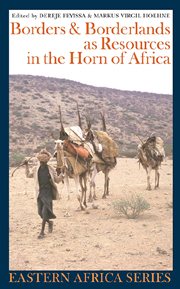Book contents
- Frontmatter
- Contents
- List of Maps, Tables & Charts
- Preface by Günther Schlee
- Editors' Preface
- Notes on Contributors
- List of Acronyms
- 1 State Borders & Borderlands as Resources
- 2 More State than the State?
- 3 Making Use of Kin beyond the International Border
- 4 The Tigrinnya-speakers across the Borders
- 5 Trans-Border Political Alliance in the Horn of Africa
- 6 People & Politics along & across the Somaliland-Puntland Border
- 7 The Ethiopian-British Somaliland Boundary
- 8 The Opportunistic Economies of the Kenya-Somali Borderland in Historical Perspective
- 9 Magendo & Survivalism
- 10 Can Boundaries not Border on One Another?
- 11 Conclusion
- Index
- EASTERN AFRICAN STUDIES
Editors' Preface
Published online by Cambridge University Press: 05 April 2013
- Frontmatter
- Contents
- List of Maps, Tables & Charts
- Preface by Günther Schlee
- Editors' Preface
- Notes on Contributors
- List of Acronyms
- 1 State Borders & Borderlands as Resources
- 2 More State than the State?
- 3 Making Use of Kin beyond the International Border
- 4 The Tigrinnya-speakers across the Borders
- 5 Trans-Border Political Alliance in the Horn of Africa
- 6 People & Politics along & across the Somaliland-Puntland Border
- 7 The Ethiopian-British Somaliland Boundary
- 8 The Opportunistic Economies of the Kenya-Somali Borderland in Historical Perspective
- 9 Magendo & Survivalism
- 10 Can Boundaries not Border on One Another?
- 11 Conclusion
- Index
- EASTERN AFRICAN STUDIES
Summary
It all began back in 2005, when we shared an office at the Max Planck Institute for Social Anthropology in Halle/Saale, Germany, and occasionally chatted about current affairs in the Horn of Africa. We both had done research in border areas and among borderlanders, and were astonished by the high degree of resonance between our field materials. Together with our common friend, Tobias Hagmann, we contemplated the idea of holding a conference on borders in the Horn of Africa. Regrettably, Hagmann's participation came to an abrupt end due to other academic obligations. We would like to thank him for his fruitful engagement with our ideas as well as the continued moral support we received from him throughout the production process. Günther Schlee, the Director of the Max Planck Institute for Social Anthropology and Head of the Department I (Integration and Conflict), generously approved our plans.
Despite the fact that we circulated a call for papers expressing an explicit interest in state borders as resources, many of the abstracts we received approached borders as constraints rather than resources. Nevertheless, we received enough relevant responses to put together a conference in Halle/Saale from 6 to 8 September 2006 under the title, ‘Divided They Stand: The Affordances of State Borders in the Horn of Africa’. It featured a good mixture of younger scholars, many of them from the region, and senior figures such as John Markakis and our most vivid and resourceful discussant, Christopher Clapham.
- Type
- Chapter
- Information
- Publisher: Boydell & BrewerPrint publication year: 2010

